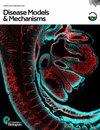在小鼠体内快速降解蛋白质的 Degron 标记。
IF 4
3区 医学
Q2 CELL BIOLOGY
引用次数: 0
摘要
通过 Degron 标记,可以在化学刺激下以可逆和可调的方式快速降解感兴趣的蛋白质。这为了解疾病机理、建立治疗干预模型和构建合成基因网络提供了大量机会。近年来,在基因组编辑和靶向蛋白质降解领域突飞猛进的发展推动下,许多实验室已在培养的哺乳动物细胞中成功应用了降解基因标签技术。在这篇 "一瞥 "文章中,我们将重点介绍最近在小鼠模型中应用degron标记技术的努力,讨论体内环境带来的一系列不同的挑战和机遇。本文章由计算机程序翻译,如有差异,请以英文原文为准。
Degron tagging for rapid protein degradation in mice.
Degron tagging allows proteins of interest to be rapidly degraded, in a reversible and tuneable manner, in response to a chemical stimulus. This provides numerous opportunities for understanding disease mechanisms, modelling therapeutic interventions and constructing synthetic gene networks. In recent years, many laboratories have applied degron tagging successfully in cultured mammalian cells, spurred by rapid advances in the fields of genome editing and targeted protein degradation. In this At a Glance article, we focus on recent efforts to apply degron tagging in mouse models, discussing the distinct set of challenges and opportunities posed by the in vivo environment.
求助全文
通过发布文献求助,成功后即可免费获取论文全文。
去求助
来源期刊

Disease Models & Mechanisms
医学-病理学
CiteScore
6.60
自引率
7.00%
发文量
203
审稿时长
6-12 weeks
期刊介绍:
Disease Models & Mechanisms (DMM) is an online Open Access journal focusing on the use of model systems to better understand, diagnose and treat human disease.
 求助内容:
求助内容: 应助结果提醒方式:
应助结果提醒方式:


